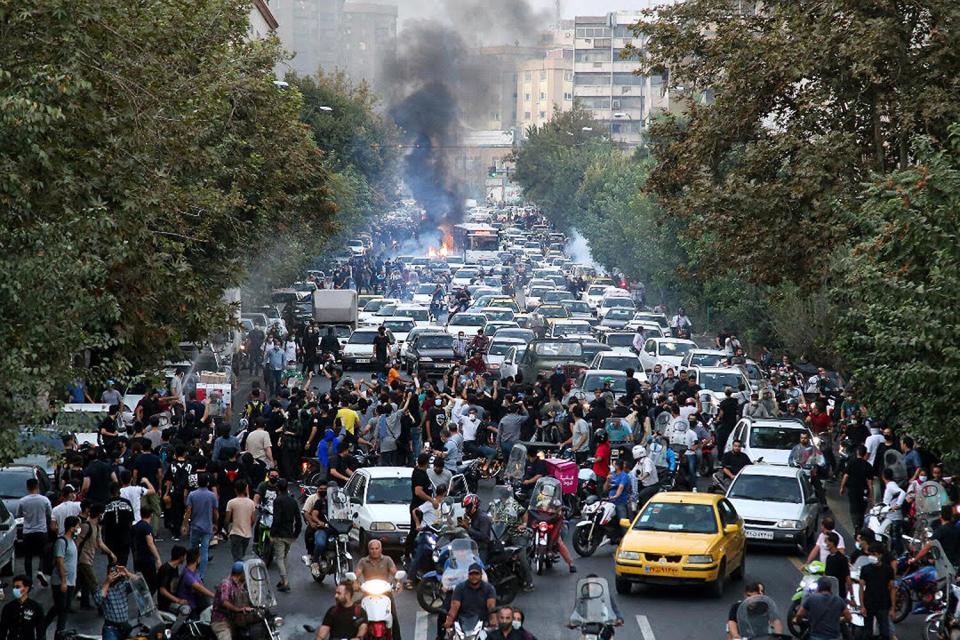CNN's Christiane Amanpour Says Iran President Cancelled an Interview After She Declined to Wear a Hijab

ANGELA WEISS/AFP/Getty Christiane Amanpour
CNN anchor Christiane Amanpour said in a Twitter thread Thursday that Iran's president, Ebrahim Raisi, cancelled a planned interview with her after she refused to wear a head scarf.
The veteran journalist's interview with Raisi was expected to focus on the death of a 22-year-old Iranian woman who died in the custody of the country's Morality Police, after being detained for allegedly wearing a hijab too loosely.
In a Twitter thread, 64-year-old Amanpour recounted how her interview was planned for Wednesday, during which she planned to ask Raisi about the protests. After hours of set-up, Amanpour wrote that she was approached by an aide of Raisi and asked to put on a headscarf.
Protests are sweeping Iran & women are burning their hijabs after the death last week of Mahsa Amini, following her arrest by the “morality police”. Human rights groups say at least 8 have been killed. Last night, I planned to ask President Raisi about all this and much more. 1/7
— Christiane Amanpour (@amanpour) September 22, 2022
"I politely declined. We are in New York, where there is no law or tradition regarding headscarves. I pointed out that no previous Iranian president has required this when I have interviewed them outside Iran," Amanpour wrote.
She continued: "The aide made it clear that the interview would not happen if I did not wear a headscarf. He said it was 'a matter of respect,' and referred to 'the situation in Iran' - alluding to the protests sweeping the country."
After she declined once more, the interview was cancelled.
"And so we walked away. The interview didn't happen," Amanpour wrote. "As protests continue in Iran and people are being killed, it would have been an important moment to speak with President Raisi."

Stringer/Anadolu Agency via Getty Iran protests
Human rights organizations have estimated that at least eight people have been killed in the protests following 22-year-old Mahsa Amini's death. Many women demonstrating have been seen burning their hijabs in protest.
According to the U.S. Treasury Department, Amini was transferred to a hospital in a coma the same day she was detained for allegedly wearing her hijab too loosely, "and died two days later from internal injuries."
RELATED: Iran Denies Involvement in Salman Rushdie Attack, Says Author Brought It upon Himself
In response to Amini's death "and other human rights violations in Iran," State Department Secretary Antony Blinken said on Thursday the U.S. has imposed sanctions — both on Iran's Morality Police and on "senior security officials who have engaged in serious human rights abuses."
As Blinken described in his statement, Iran's Morality Police is part of the country's Law Enforcement Forces, and " arrests women for wearing 'inappropriate' hijab and enforces other restrictions on freedom of expression."
The sanctions will target "seven senior leaders of Iran's security organizations: the Morality Police, Ministry of Intelligence and Security (MOIS), the Army's Ground Forces, Basij Resistance Forces, and Law Enforcement Forces," according to the Treasury Department.
"These officials oversee organizations that routinely employ violence to suppress peaceful protesters and members of Iranian civil society, political dissidents, women's rights activists, and members of the Iranian Baha'i community," the Treasury Department statement said.

AFP via Getty Iran protests
Never miss a story — sign up for PEOPLE's free daily newsletter to stay up-to-date on the best of what PEOPLE has to offer.
Meanwhile, while the protests rage on, access to social media sites such as Instagram and WhatsApp have been curbed in Iran, Reuters reports.


